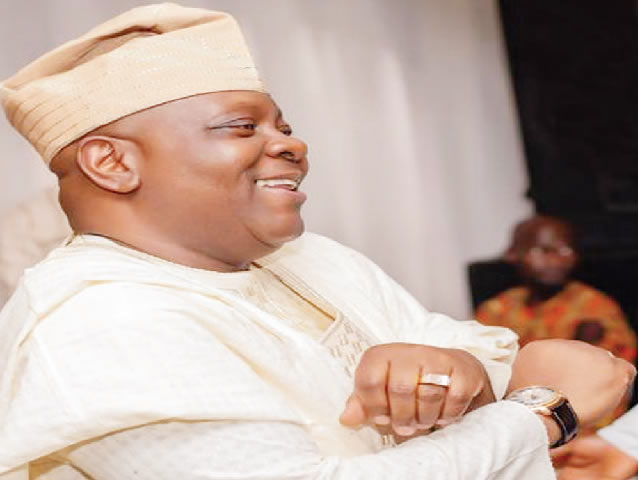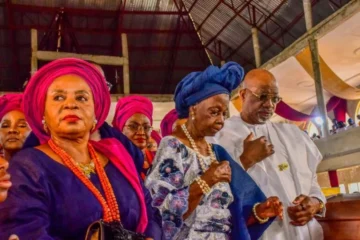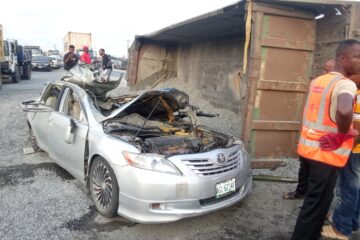Federal structure of Police not working, allow for state police – AIG Imohinmi Edgar (retd.)

Tell us about your childhood
I’m a Christian from Edo State. My late father, Samuel Fowowe Edgal was an educationist, the Chief Inspector of Education for Old Mid-West and a retired Permanent Secretary. My late mother, Deborah Ebun Edgal hails from Usi-Ekiti, Ekiti State, She was a personal Principal Secretary to most of the Chief judges of Edo State.
I attended schools in Benin City and Warri and University of Jos for my primary, secondary and tertiary education. I have a Masters from University of Lagos in Public and International Affairs.
I joined the Nigeria Police immediately after my national youth service. I will be 60 on July 13.
Why did you join the police?
There were many reasons. When I was little, I always had this desire to render selfless service to people in whatever capacity. My late uncle was a policeman. Anytime he came to our house in Benin City in his uniform, we used to watch him from afar. He looked clean, sharp and carried an air of authority and dignity in his person, I think that was the earliest time I started to admire the police uniform and admired the authority the uniform gives.
Fortunately, the official residence of the Commissioner of Police (CP) for Edo State was few streets from the house we lived, so from time to time, we saw his official convoy pass through Boundary Road to his residence.
In those days, it was only the CP of Police and the Governor that used the BMW Outrider. It was part of the paraphernalia of office, with the escorts and the flag on his vehicle, so as a young man I found all these things interesting.
When I finished school and visited my mother in her office, I would see policemen working with them in the judiciary. So when I finished the youth service, I told my mum I would like to be a policeman. It was a serious issue.
She and my father tried to find out why and I told them I loved the job, that I believed being a policeman is one of the surest ways to offer selfless service to Nigeria.
The then Inspector General of Police, the late Etim Inyang was someone that my mother had worked with while he was CP in Edo State. So she mentioned it to him. He was excited when he heard about me. Then forms for entry into the cadet scheme of the police were sent to me.
I attended the recruitment interviews at the Police College, Ikeja, got screened, took a short exam, passed and was appointed as a cadet into the police.
After my training, I was among the first set to be trained for 13 months before we passed out as Cadet Assistant Superintendents of Police. The training period was between 1986 and 1987. I spent 35 years in the Force and today I’m retired.
Can you compare the police of then and now?
First of all, I know that life in itself is dynamic. Nothing is static, and when you want to talk about comparison, you must take it in a holistic form, in its totality, because of the kind of criminal cases, nature of crime, prevalence of crime, tempo of crime and sophistication of crime.
When I joined the Police Force it’s not the same as now, so it will be wrong for me to say that the force was better then than now.
However, there are certain aspects of police job and policing that I consider were more stable and better.
Discipline was indeed the bedrock of the force and was as a result of supervision by senior officers which I consider lacking today at the police post, police station, Area Command and other levels.
The issue of discipline was not taken for granted, or compromised in any form whatsoever. Personally, I think that my earlier days in the Force were better.
In terms of comparison, even though I concede that we have more issues now that the police have more to contend with now than before, we didn’t have some of the major crime trends that we have now.
While I concede that the Force has a lot to contend with now, that will not stop me from also mentioning that back then as young officers, we had tools to work with and I expect that the hierarchy of the Force and government must know that the Force has more to contend with, newer, more diverse, more dangerous types of crimes.
Then more funds must be made available not only to train its officers on how to handle these kinds of crimes but also to provide them with required equipment and logistics to be able to handle it.
Were you married before you joined the police? And how did you meet your wife?
I met my wife immediately after joining the Force. I remember, immediately you finish one year attachment period, you do your confirmation exams and you are given the second peak and that means you are now a confirmed Assistant Superintendent of Police.
I was then deployed to the State Criminal Investigation Department. That was when I met my wife, but not in the course of police duties. It was during a private visit.
My brother was invited to a function and I accompanied him. He was the one that introduced my wife-to-be to me.
The first time I saw her, what struck me was that I had seen an angel. Probably it was her beauty or just my own first impression. And we started talking, socialising and communicating until we fell in love and we decided to inform our parents and get married.
Her name is Mary. She’s now a pastor with Where Women Pray in Ogba branch in Lagos. She’s from Igbuzor in Delta State. We are blessed with three children.
How was it like combining your duties as a father, husband and police officer?
It was very difficult. This is one area I want Nigerians to please appreciate policemen and police women. You know I used that phrase, selfless service.
Policemen do really render selfless service because whether you like it or not, if you want to do your work diligently, one thing must suffer.
Let me tell you why I said so. As a policeman, you cannot complain about posting. Anywhere you are posted to, you must go and work there.
Most policemen are always dislocated from their families. You start your police work in Lagos or in Bauchi. You get married and you have a kid. The kid is still one or two years or just trying to grow up, you are transferred from there to Delta.
Of course, it’s not convenient to move your wife and kid because by that time, your wife has got a job in that locality, your kid is attending school. If you insist on going with them, you are disrupting the existence of your wife, disrupting the schooling of your child.
So most times, the policeman leaves the wife there and goes to a different location. Same thing too for the policewoman who also has to move. We were not always at home to monitor the development, the growth of our children and give them the desired love that they deserve and this is the problem that most policemen face.
For me, I was a bit more fortunate. I take my own case as just the grace of God. I spent most of my service years in Lagos. I used the word, God, but I must also add that I was hardworking. So I was detected early by my bosses. So unknown to me, when I reflect back, I now begin to understand that most likely my bosses were the ones that did not want to release me, that was why I spent more time in Lagos. So that gave me some level of stability when it comes to my wife and children because they were with me for longer periods.
So if you don’t have a pious wife, if you don’t have a good spiritual, very strong Christian or Muslim woman, who not only supports you on her knees praying every time and is your bedrock when it comes to taking care of the family, then you see your marriage and your children falling apart.
Let me mention this. Right from my intermediate years when I was Chief Superintendent of Police, I was one of those who started to think about the concept of state policing, local policing and community policing, where policemen are allowed to work and have a career in their locality.
It takes care of a lot of problems. It gives them stability. They are also more efficient because they come from that area; they understand the area, the policing problems, trends, they know their people, able to relate better with their people and offer better service beyond fighting crime.
Where was your last point of call in the police?
Operationally, that was Akwa Ibom as a Commissioner of Police. Before I retired, I was seconded to the now defunct Federal Special Anti-Robbery Squad (FSARS). Soon after, I was promoted to AIG of Police before I retired. I was in FSARS for three months.
You were once posted to Ogun State but there were reports that personal issues with Governor Dapo Abiodun affected your stay. Can you tell us more about that?
This is the second time I’m hearing that. It is absolute and totally false. Let me take you through the process of postings of police officers, I think civilians need to hear this so that they don’t continue to make the same mistakes.
A Commissioner of Police is deployed to State Command or any formation by the IGP. His name is now forwarded to the Police Service Commission, just for ratification. I am not saying that a governor or any senior person in government might not have a preference, but in having a preference, such a person must go about it unofficially, make an unofficial request and it is the prerogative of the IG to look into it or not. In this particular case, I was deployed to Ogun State. Two days after, I received a call from the IG that, there is need for some reshuffle, there are some assignments that we want you to handle in some other command and immediately on the third day, I reported at Akwa Ibom. I have never once met the governor. As I speak to you, I never for once face-to-face met him. I have never had any dealings with the governor. I don’t even think he knows me.
So if anybody says that we had issues, that is absolutely wrong. I would love to even work with him now, maybe on security matters as a consultant because I hear he is doing very well when it comes to providing security.
What were your most memorable moments as a police officer?
They are many. But If you say the most challenging, I would say it is the ‘Badoo’ crisis in Lagos. When the crisis started, it was a bizarre kind of crime that people will describe as satanic.
In certain neighbourhoods, especially in Ikorodu, people would go there and smash the heads of entire family members (husbands, wives and children) with certain stones, smear their blood with white handkerchief and go away with the handkerchief. All efforts that had been put in place even before I became the Deputy Commissioner of Police, Lagos State Operations, did not seem to be working.
The only way to solve such dangerous crime is through community policing and community engagement. When I became the DCP, I first reached out to the informal security sector, the Gani Adams’ Oodua Peoples Congress, Onyeabo Group, the hunters, traditionalists, then I went to the Ayangburen of Ikorodu and prevailed on him to invite all chiefs.
We held the first meeting in Kabiyesi’s palace with all security agencies. Of course, nobody was in doubt that there was a security problem.
People were already packing out of Ikorodu. Some children were already called by their parents to say, I am sending you money. Just leave the place.
I received a lot of information and help from the various groups because I involved them and made them understand that this is the problem and that without information, relevant intelligence, by collaboration, nothing can be solved. If everybody wants to do it individually and if we don’t come together, we cannot handle it.
The information started to come and we were able to discover some shrines in Ikorodu and they were demolished. Eventually, we were able to fight this group to a standstill. We traced them to their last location, a remote village in Ogun State, where we saw the stones and we were able to arrest the kingpin and his group.
They have been jailed. It is my hope that they are still in prison. And since then, the issue of Badoo ended. It was in this period while the fight was on that I was promoted to CP. I concluded that case of ritual killings of a bizarre nature in Ikorodu as the police commissioner in Lagos. That was perhaps my most challenging period.
How did you feel when you were about to retire? What have you been doing since then?
It is not easy for a man to do 35 years on a job and leave that job unblemished, in good health, with his wife still by him and his children doing well.
I felt happy. I felt grateful to God. I felt elated. No regrets whatsoever at all. I joined the Force as a young man. I was about 23 years or so and I did not do any other job for 35 years of my life, I served the nation meritoriously as a policeman. I retired as AIG.
What else could I ask for? I’m still young, I’m still physically and mentally sound and I still have more to offer the nation if I am called upon to serve at anytime.
Now that I have retired, it has given me the opportunity to bond more and draw close to God. I spend more of my time now in religious activities and of course, I also have time to socialise. I’m a member of Ikoyi Club and Ikeja Golf Club where I play golf.
When I retired, I set up a company, Apollo Security company. We offer consultancy, we also supply security equipment that do not require end user certificate, and it’s keeping me busy. So I would only thank the Almighty God for what he has done for me in the past, what he is doing now and what He is still going to do tomorrow.
Now that you’ve served and have retired, what would be your advice on how to reposition the police?
We have to talk about the structure of the Force. This is my personal opinion – the present structure of the Force, the federal structure of the Force is not working. Government has to sponsor a legislation to change the constitution to allow for state police.
I think it’s high time that states began to handle their police force. Policing is local business. As it stands now, believe me, governors in their various states take care of more than 40 or 50 per cent of the policing needs of the policemen in their states, even though the Police Force is a federal institution.
I’ve been a CP in states, so I know what I am talking about. The argument that some states won’t be able to fund their police force is an exception to the rule.
Once you have state police, you are also having fiscal devolution too. Because this idea of all the funds going straight to Force Headquarters and the states/area commands, police posts, local government police areas are left without adequate funding. So there must be also fiscal devolution.
If there is state police, let them be funded adequately by the state government and from probably a special fund that will be arranged for at the federal level with the huge financial involvement in running the Police Forces, like the federal administration set up a Police Trust Fund.
Also, the people themselves, not only government, must be involved in determining leadership for their various police force. In some countries, before you become CP in a state, the Council of Elders would meet and review your Curriculum Vitae.
.Saturday SUN











